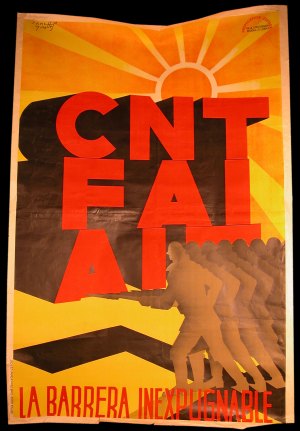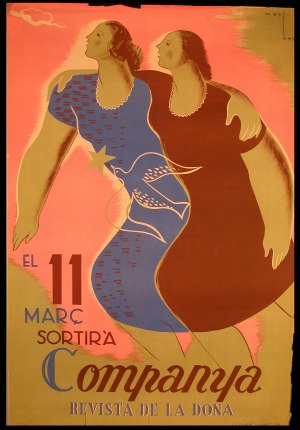

Written:August 2, 1931.
First Published: Fourth International [New York], Vol.IV No.10, October 1943, pp.317-318.
Translated: Fourth International.
Transcription/HTML Markup: David Walters.
Copyleft: Leon Trotsky Internet Archive (www.marxists.org) 2003. Permission is granted to copy and/or distribute this document under the terms of the GNU Free Documentation License.
The purpose of this letter is to exchange our views on the occasion of the tumultuous strike movement in Spain. In my second pamphlet on the Spanish revolution, I indicated in detail one of the possible perspectives: the revolutionary movement develops violently without the correct leadership and concludes in an explosion which the counter-revolutionary forces may exploit in order to smash the proletariat. As pointed out in the pamphlet, this perspective does not of course mean that the role of the communists should be to hold back the revolutionary movement. I do not doubt that in this respect we will have no differences, but I would like to analyze this question more thoroughly, because it may become of great practical importance.
First of all, it is necessary to make clear that this violent elemental outburst of strikes is the inevitable outcome of the character of the revolution itself, being in a certain sense its basis. The overwhelming majority of the Spanish proletariat does not know what organization means. During the time the dictatorship lasted, a new generation of workers grew up, which is lacking in independent political experience. The revolution awakens – and in this lies its force – the most backward, downtrodden, the most oppressed toiling masses. The strike is the form of their awakening. By means of the strike, various strata and groups of the proletariat manifest themselves, signal to each other, verify their own strength and the strength of their foe. One layer infects and awakens the other. All this together makes the present strike wave absolutely inevitable. Least of all do the communists have to be afraid of it, for this is the very expression of the creative force of the revolution. Only through these strikes, with all their mistakes, with all their “excesses” and “exaggerations,” does the proletariat rise to its feet, assemble itself in one unit, begin to feel and to conceive itself as a class, as a living historical force. Never have revolutions developed under a conductor’s stick. Excesses, mistakes, sacrifices are the very nature of any revolution.
Had the Communist Party told the workers: “I am still too weak to guide you, therefore, wait a little, don’t press too much, don’t start the fight by striking, give me a chance to become stronger,” the party would have made itself hopelessly ridiculous, the awakening masses would have stepped over it, and instead of becoming stronger, the party would have only weakened.
Even if you have foreseen correctly a historical danger, this does not mean that you may eliminate it by mere reasoning. The danger can be removed only if you possess the necessary strength. But in order to be such a force, the Communist Party must enter wholeheartedly into the arena of the developing “elemental” or semi-elemental strike movement, not in order to hold it back, but in order to learn to direct it, and in the very process of the struggle, acquire authority and strength.
It would be a mistake to think that the present movement was provoked by the anarcho-syndicalists. The latter are themselves under the indomitable pressure from below. The leading group of the syndicalist nucleus would like to slow up the movement. Individuals like Pestana are certainly negotiating behind the stage with the employers and administration about the best means of liquidating the strikes. Tomorrow, many of these gentlemen will prove to be the executioners of the workers and, while shooting them, as the Russian Mensheviks did, will preach against the “intoxication of strike,” and so on.
One cannot doubt that along this line will grow the differ-entiation among the anarcho-syndicalists. The most revolutionary wing, the further it goes, will find itself ever more in contradiction with the syndico.reformists. From out of this left wing will inevitably surge up putschists, heroic adventurists, individual terrorists and others.
Needless to say, we cannot encourage any kind of adventurism. But we must in advance be certain that not the right wing which combats the strikes, but the left revolutionary syndicalist wing will come closer to us. It will be all the more easy to overcome all kinds of adventurist elements, the sooner the revolutionary syndicalists are convinced that the communists are fighters – not rationalizers.
The official [Communist] party is being accused of an adventuristic policy in the field of strikes. I personally cannot judge in the matter due to my lack of information. The general attitude of the party in the previous period, however, leads one to think that this charge is probably justified. But precisely for that reason there is a danger that having burnt its fingers, the party may abruptly turn to the right. The greatest mis-fortune would be if the working masses would come to the conclusion that the communists, just as the syndicalists of the type of Pestana, would like to instruct them dogmatically, from the top downward, and not to rise with them from the bottom upward.
Summarizing: The danger of June days [1] remains without any doubt the gravest in the perspective, but the most immediate danger for the communists may become abstract arguing, “trying to appear intelligent,” abstract coaxing, which revolutionary workers will regard as pessimistic croaking.
The Left Opposition must not forget for a single moment that dangers which arise from the development of the revolution should be overcome not by watchful caution but by audacity, audacity, and more audacity.
1. A deliberate provocation to bring the workers into the streets in order to shoot them down; derived from the bloodletting of June in the French revolution of 1848. – Editor
  Return to Trotsky’s
|

Last updated on: 15.4.2007